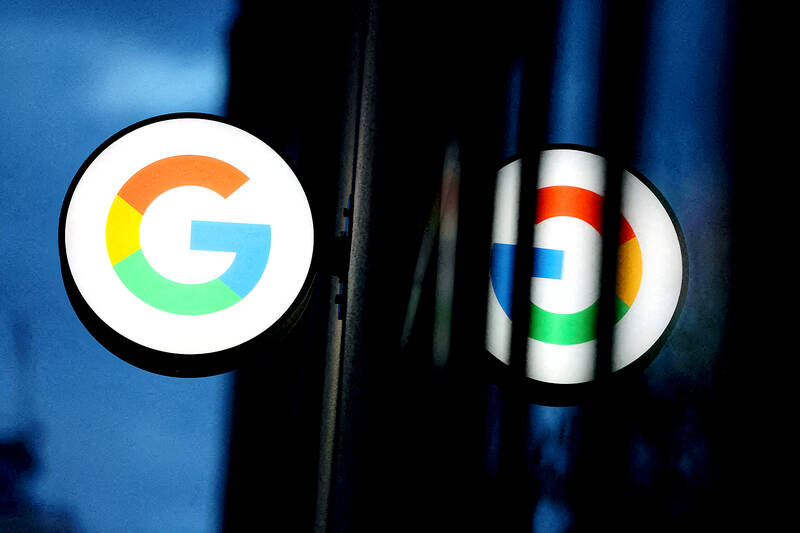Google on Wednesday announced a number of new features powered by artificial intelligence (AI), but a mistake made by its AI application on Twitter caused its share price to tank.
The search engine giant is rushing into the space after ChatGPT caught the imagination of Web users around the world with its ability to generate essays, speeches and even exam papers within seconds.
Microsoft Corp last month announced a multibillion-dollar partnership with ChatGPT maker OpenAI, and yesterday unveiled new products, while Google tried to steal the spotlight a day earlier by announcing an alternative called Bard.

Photo: Reuters
The AI applications are quickly being integrated into search engines, and Google is battling to preserve its two-decade dominance of the Web search industry.
However, astronomers and other keen observers on Twitter quickly noticed that Google’s Bard had produced an error in a Twitter post touting its new technology.
In the post, Bard was asked what to tell a nine-year-old about discoveries from the James Webb Space Telescope.
It incorrectly said that the telescope was the first to take pictures of a planet outside Earth’s solar system, when that honor actually belongs to the European Very Large Telescope.
The mess-up sent the share price spiraling down by more than 7 percent on Wednesday, with investors also underwhelmed by the latest announcements.
Before the problem emerged, Google vice president Prabhakar Raghavan told an event in Paris that Bard was now being used by “trusted testers,” but did not provide a timeline for a public release, which is expected within weeks.
Analysts have suggested that Google rushed its announcement under pressure from Microsoft, but Raghavan denied the claim.
“This has been a multiyear journey,” he said, adding that no single event had “dramatically changed the course” of Google’s plans.
Google executives on Wednesday announced several AI-induced improvements across products such as maps, translation and its image recognition tool Lens.
Microsoft has said it plans to incorporate AI into its Office suite and Teams messaging app.
However, its promise to soup up its much-maligned Bing search engine put it on a collision course with Google, which has dominated the field for two decades.
Separately, Chinese e-commerce giant Alibaba Group Holding Ltd (阿里巴巴) on Thursday said it is working on a rival to ChatGPT, joining a flurry of global tech firms rushing to match the popular AI-powered chatbot.
The ChatGPT-style conversation application is being tested by employees, a company spokeswoman said.
She declined to offer details on when the service would be launched or whether it would be part of Taobao (淘寶), China’s largest online shopping platform.
The announcement comes days after Chinese search giant Baidu Inc (百度) said it would complete testing of its AI chatbot next month.
However, Beijing has said that using AI chat technology to create chillingly accurate digital doppelgangers through “deepfakes” presents a “danger to national security and social stability.”

SEEKING CLARITY: Washington should not adopt measures that create uncertainties for ‘existing semiconductor investments,’ TSMC said referring to its US$165 billion in the US Taiwan Semiconductor Manufacturing Co (TSMC, 台積電) told the US that any future tariffs on Taiwanese semiconductors could reduce demand for chips and derail its pledge to increase its investment in Arizona. “New import restrictions could jeopardize current US leadership in the competitive technology industry and create uncertainties for many committed semiconductor capital projects in the US, including TSMC Arizona’s significant investment plan in Phoenix,” the chipmaker wrote in a letter to the US Department of Commerce. TSMC issued the warning in response to a solicitation for comments by the department on a possible tariff on semiconductor imports by US President Donald Trump’s

‘FAILED EXPORT CONTROLS’: Jensen Huang said that Washington should maximize the speed of AI diffusion, because not doing so would give competitors an advantage Nvidia Corp cofounder and chief executive officer Jensen Huang (黃仁勳) yesterday criticized the US government’s restrictions on exports of artificial intelligence (AI) chips to China, saying that the policy was a failure and would only spur China to accelerate AI development. The export controls gave China the spirit, motivation and government support to accelerate AI development, Huang told reporters at the Computex trade show in Taipei. The competition in China is already intense, given its strong software capabilities, extensive technology ecosystems and work efficiency, he said. “All in all, the export controls were a failure. The facts would suggest it,” he said. “The US

The government has launched a three-pronged strategy to attract local and international talent, aiming to position Taiwan as a new global hub following Nvidia Corp’s announcement that it has chosen Taipei as the site of its Taiwan headquarters. Nvidia cofounder and CEO Jensen Huang (黃仁勳) on Monday last week announced during his keynote speech at the Computex trade show in Taipei that the Nvidia Constellation, the company’s planned Taiwan headquarters, would be located in the Beitou-Shilin Technology Park (北投士林科技園區) in Taipei. Huang’s decision to establish a base in Taiwan is “primarily due to Taiwan’s talent pool and its strength in the semiconductor

French President Emmanuel Macron has expressed gratitude to Hon Hai Precision Industry Co (鴻海精密) for its plan to invest approximately 250 million euros (US$278 million) in a joint venture in France focused on the semiconductor and space industries. On his official X account on Tuesday, Macron thanked Hon Hai, also known globally as Foxconn Technology Group (富士康科技集團), for its investment projects announced at Choose France, a flagship economic summit held on Monday to attract foreign investment. In the post, Macron included a GIF displaying the national flag of the Republic of China (Taiwan), as he did for other foreign investors, including China-based